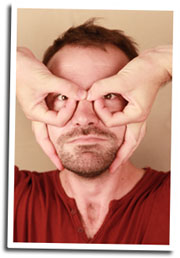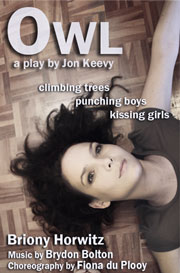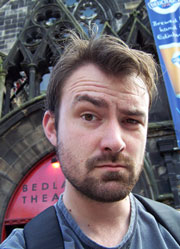
Top stories




LegalTsotsi star’s house, bought with lottery funds, frozen by Special Tribunal
Raymond Joseph 18 hours


More news



Armed with an MA in theatre-making as well as a fervent passion for his craft and his art, Keevy has enjoyed a long-time collaboration with Bosnian-born director Sanjin Muftic. Together they've produced four plays at the National Arts Festival, toured to Rwanda and Knysna, run an underground theatre and created projections for stage productions - most recently, Wagner's opera The Flying Dutchman directed by Lara Bye. As a production manager, he has worked with directors such as Bye, Christopher Weare, Geoff Hyland, Alan Committie, Peter Krummeck, Mike van Graan and Lara Foot.
Keevy is a passionate "theatre animal". What excites him about theatre is "the limitations and the way the creative team uses them - they can either unleash their imagination and innovation in staging and design or craft a story and performance so intimate that we forget where we are".
With Owl, Keevy has established himself as a voice that deserves to be heard.
The play charts a friendship that starts in the heat of the Overberg summer between two 10-year-old girls, finding them again six years later. Olivia arrives in the town with her dad; she is the new girl, the quiet girl, the weird girl. Then she meets Kay, the girl with the scar. Briony Horwtiz performs 10 characters, from the two young girls and their teenage counterparts to both their fathers and a group of boisterous men.

For Keevy, there was no "light bulb moment" that started his inspiring journey into the world of Owl.
"Owl started out as a completely different story," he said. "I think there are two ways I write: either I work out the whole story in advance of the scenes and characters or I write scenes and moments and continuously throw them out and start over as I grope toward the structure. During the process of writing Owl, I found that there was a lot of discussion in real life and online about domestic abuse and sexuality - this really shaped the direction the script went in."
As a "very technical designer", Keevy's inspiration is grounded in "solving problems simply" and to "create sets that are transformable physically and symbolically".
He regards himself as equally structured when it comes to his writing.
"I'll spend a lot of time walking around letting ideas simmer - letting connections grow - but I find that only gives you a solution when you know what the problem is."
For Keevy, it was not a difficult process to transform words into action.
"I planned the production well in advance - booking space, saving money and approaching the creative team I wanted. I've been working in theatre for a long time now, so I've pretty much made every mistake there is to make without actually burning something down."
He also took on the task of directing his own play, something he does not advise writers to do.
"It's not advisable in any job to spread yourself too thinly. I was the writer, producer, publicist, director, designer, and carpenter. That's ridiculous and I should not have done it. I did it out of necessity and it worked because I planned it well and had amazing support."
He found that he was directing the play while he was writing it.
"I had no actor in front of me or a stage, but I could see it happening. That wouldn't have been very useful, though, if I hadn't assembled a really great production team. Briony Horwitz is a great actress and really understands the material, while Fiona du Plooy - well, we're actually still trying to work out how to credit her. She brought out the physical side of the performance and was also my outside eye. Both offered many insights into the story and sent me off to rewrite or write whole new scenes several times."
Despite the warm reception and rave response to Owl, Keevy finds that the word "successful" is "a pretty fraught label".

For him, what makes a play work is its "sincerity and connection to your audience".
"Clever and witty have their place, but your story needs heart to stay with an audience. The main ingredient, though, is marketing. You need good, good marketing. Whatever your play is, from the most mainstream concert hall comedy at the Baxter to the avant garde solo dance piece on a rooftop in Salt River, you need to find the people who'll connect with it and tell them about it. That's marketing."
During the first performance of Owl at the Intimate Theatre, when he sat with his audience listening to the words he wrote and watching it come to life, he told himself that he was going to "give up writing and never go into a theatre again".
"I'm still a little suspicious that people are in a giant conspiracy to be nice to me. Probably orchestrated by my mother," he laughed.
He finds that the response to Owl has been so great because "people connect to the genuine, but not overt, South African setting and characters".
"Many people have said: "That reminded me of growing up" or: "That reminded me of this girl I knew", which, given the themes, is really depressing. Domestic abuse is so pervasive that we all knew that kid who had too many bruises or who came to school with unwashed clothes, who just had a shadow over them."
If you want to experience Keevy's Owl, make sure to see it at the Kalk Bay Theatre. It only runs until 5 May before it heads to Grahamstown where it will form part of the Cape Town Edge.
For more on Owl and Jon Keevy, go to jonkeevy.com and http://www.writingstudio.co.za/page1746.html
